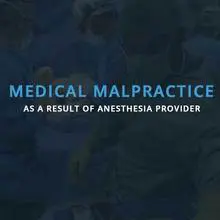Medical Malpractice as a Result of Anesthesia Provider

Anesthesia is so commonplace today, it’s hard to believe that what we now know as “modern anesthesia” has only been around since 1846, when a Boston dentist first used nitrous oxide gas to help alleviate a patient’s pain during a dental procedure. Prior to that, doctors were limited to primitive means of limiting pain, and most surgeons relied on speed instead of skill during surgery due to the lack of anesthetic. Anesthesia has come a long way since then, and doctors use it routinely during a wide range of surgical procedures.
However, anesthesia is still a potentially dangerous part of any medical procedure, and it requires a skilled, experienced, and competent doctor to administer it. Unfortunately, anesthesia mistakes can cause a patient to suffer catastrophic harm. In the most devastating cases, a patient dies due to an anesthesia provider’s negligence.
What Is Anesthesia?
An individual doesn’t need to be completely unconscious to experience medical malpractice as a result of an anesthesia provider. There are various forms of anesthesia, and a doctor’s mistake can occur with any one of them.
General Anesthesia – This is the type of anesthesia with which most people are familiar. When you undergo general anesthesia, you are completely unconscious. In most cases, the doctor must insert a breathing tube to help you keep breathing.
Regional Anesthesia – Regional anesthesia is used to numb a large area of the body, such as a spinal block or epidural anesthesia used during childbirth. When regional anesthesia is used, the patient retains consciousness.
Local Anesthesia – Local anesthesia anesthetizes a small section of the body, such as a limb where a patient is receiving sutures.
One survey of over 2,200 members of the Canadian Society of Anesthesiologists found that 30 percent of those doctors admitted to making at least one anesthesia error over the course of their practice. The journal Anesthesiology reports that “each year in the United States, anesthesia/anesthetics are reported as the underlying cause in approximately 34 deaths and contributing factors in another 281 deaths, with excess mortality risk in the elderly and men.”
How Do Anesthesia Mistakes Occur?
Anesthesia errors can happen in a number of ways. Research reveals that the most common type of anesthesia-related medical malpractice is the wrong drug dosage. However, there are numerous other mistakes that are known to occur when an anesthesiologist or nurse anesthetist makes a mistake.
Dosage Mistakes – Anesthesia drugs are extremely powerful. When a doctor gives a patient too much of an anesthesia drug, it can stop a patient’s heart or cause other emergency situations. Anesthesia dosage mistakes can occur when a doctor gives a patient the wrong amount of drug, or when a doctor mistakes one anesthesia drug for another. These types of errors can also happen when a doctor fails to check for drug allergies or drug interactions.
Intubation Injuries – The failure to intubate can cause a patient to suffocate or stop breathing. An improperly placed intubation tube can also cause major injuries or death.
Failure to Monitor – When a patient is under the influence of anesthesia drugs, it’s imperative for the anesthesiologist or other qualified health professional to monitor the patient’s heart rate and other vital signs. A failure to monitor can lead to a cascade of complications that result in serious injury or death.
Lack of Oxygen – It’s extremely important for a patient to receive adequate oxygen during sedation. A lack of oxygen can cause irreversible brain damage and even death.
Birth Injuries – Anesthesia plays a role in the majority of births, from epidurals placed during vaginal births, to spinal blocks used in cesarean section deliveries. Not only can mothers sustain serious injuries, such as nerve damage and paralysis, due to anesthesia mistakes, but anesthesia errors can also harm unborn babies. For example, a baby deprived of oxygen during the birthing process due to an anesthesia mistake can suffer a permanent brain injury.
Anesthesia Awareness – Anesthesia awareness is a condition in which a patient regains some level of consciousness during surgery. In many cases, a patient can’t speak or alert medical staff, but the patient can feel pain. This is a horrifying experience for patients that can leave them with lifelong emotional and physical pain and trauma. Some patients who experience anesthesia awareness also develop post-traumatic stress disorder that makes it difficult or impossible for them to seek medical help when they need it.
Post-Operative Complications – Anesthesia can also cause patients to suffer post-operative complications, such as pneumonia, bleeding, and post-operative pain. When these conditions are improperly or poorly managed, patients can sustain serious injuries. In some cases, patients pass away due to complications from anesthesia, such as pneumonia caused from lungs that never recover from intubation. Other patients experience life-threatening blood clots in their lungs or extremities due to mismanagement of their circulatory system while being anesthetized.
Anesthesiologist’s Liability for Medical Malpractice
Because many anesthesiologists and nurse anesthetists are independent contractors rather than employees of the hospitals and surgery centers in which they work, patients don’t always know how to pursue a medical malpractice lawsuit against them. Most jurisdictions also have narrow time limits in which patients are permitted to file a medical malpractice claim.
This is why it’s important for patients who suspect they’ve been a victim of medical malpractice as a result of an anesthesia provider to work with an experienced medical malpractice lawyer.
Sources:
- https://www.ncbi.nlm.nih.gov/pubmed/22583009
- https://www.ncbi.nlm.nih.gov/pmc/articles/PMC2933474/
- https://www.ncbi.nlm.nih.gov/pmc/articles/PMC2697561/
Jonathan C. Reiter Law Firm, PLLC
ATTORNEY ADVERTISING
Prior results cannot and do not guarantee or predict a similar outcome with respect to any future case. Recoveries always depend upon the facts and circumstances of each case, the injuries suffered, damages incurred, and the responsibility of those involved.

